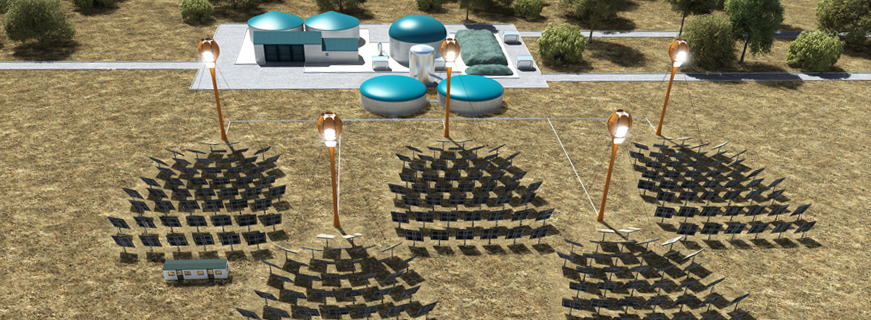An Israeli project will provide electricity for off-grid communities in Ethiopia.
A prototype solar energy plant in southern Israel. (Photo: aora-solar.com)
Even today, there are countries in which people have no access to basic resources that we in the West would consider essential. We often take for granted amenities such as clean water and electricity, but people who live in remote areas of developing countries such as Ethiopia do not necessarily enjoy such access.
Ethiopia is a country with a significant amount of what are called “off-grid” locations. This means that these villages are not connected to any regular electricity source, and people living there have no artificial lighting, refrigeration or heat. Cooking fuel is often in short supply.
An Israeli start-up called AORA aims to change that.
Innovative Back-Up System
Solar energy is an ideal solution for such places, but it has one downfall: It relies on the presence of the sun to provide power. So when the sun goes down – the time of day when power is most needed for lighting and heat – most solar power systems stop working.
Neither can these systems operate during the rainy season, so they cannot be used for refrigeration, for instance, which requires round-the-clock power. Refrigeration is crucial for allowing farmers to get their produce to market without rotting.
Zev Rosenzweig, CEO of the Israeli energy technology company AORA, believes he has a solution. AORA developed a hybrid system that utilizes solar energy to the fullest and then supplements it with a special backup system that keeps the electricity flowing even when the sun goes down.
Sunlight is enhanced by a series of mirrors, which heat compressed air to over 1800 degrees Fahrenheit and drive a turbine. When the sun goes down, the system changes over from solar to bio-gas in order to power the turbines. This bio-gas is derived from animal waste, bio-diesel, natural gas – just about any material that can be burned for fuel.
Minimal Operating Cost
According to Rosenzweig, the best thing about the system is that it does not require water, which is especially important in Ethiopia and other places where H2O is often in short supply. It also has an operating cost of next to nothing.
The system, called Tulip, has been in research and development for the past six years and is finally ready to be implemented. Last week, AORA announced that it had signed a deal to build one of its Tulip power plants in Ethiopia, providing energy and heat to off-grid rural locations.
“Electricity can change the lives of people in the developing world, and the Tulip system can provide an effective solution to any community anywhere,” said Rosenzweig.
By: Penina Taylor, United with Israel
Click here for the latest Good News from Israel.
Do You Love Israel? Make a Donation - Show Your Support!
Donate to vital charities that help protect Israeli citizens and inspire millions around the world to support Israel too!
Now more than ever, Israel needs your help to fight and win the war -- including on the battlefield of public opinion.
Antisemitism, anti-Israel bias and boycotts are out of control. Israel's enemies are inciting terror and violence against innocent Israelis and Jews around the world. Help us fight back!
